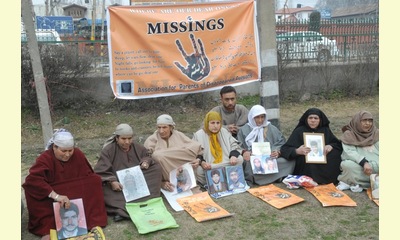|
|
Where Have You Hidden My New Crescent Moon?
un article par Tairah Fidous
FOR someone who is not familiar with Kashmir, the short film
Where Have You Hidden My New Crescent Moon? is a story packed
with pathos, but soon to be forgotten once a new day has dawned.
However, for countless Kashmiris, its a story that they have to live
with all their life — of hoping against hope to find their missing
children and often dying without ever finding them. 
A scene from the film
click on photo to enlarge
The film by Kashmiri Film Maker, Iffat Fatima, is an attempt to draw
attention to forced disappearances in Kashmir. The film presents
one such story, of an old mother called Mughal Masi who spent the
last 20 years of her life waiting for her sons return before dying in
vain on October 26, 2009.
“ I did not have any intention to make a film on Mughal Masi. I
have been working on the ongoing project Half Widows in
collaboration with the Association of the Parents of Disappeared
Persons in Kashmir ( APDP) since 2006. I had gone to see Mughal
Masi on April 1, 2009, because she was sick. Four hours of
conversation with her on that day is what became Where Have
You Hidden My New Crescent Moon? ” shares Fatima.
Mughal Masi lived in Habba Kadal, Srinagar in Indian occupied
Kashmir. On September 1, 1990, her only son Nazir Ahmed Teli,
a teacher, disappeared and was never found again. Fatima's film
is a tribute to Mughal Masi and her quest for justice. The film not
only shows the agony and pain of the families who have been
waiting for their loved ones to return back since last two
decades, but it also shows how these families especially women
protest against the human rights violations in Kashmir.
In the film, Mughal Masi does not accuse anyone. What she says is,
"some hawks came and swapped my son." She uses poetic language
and metaphors to protest and tell her story, not violence.”
|








|
DISCUSSION
Question(s) liée(s) à cet article:
Films for human rights,
* * * * *
Commentaire le plus récent:
This discussion question applies to the following articles:
Where Have You Hidden My New Crescent Moon?
A Path to Dignity: The Power of Human Rights Education

|
|









